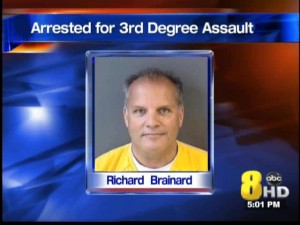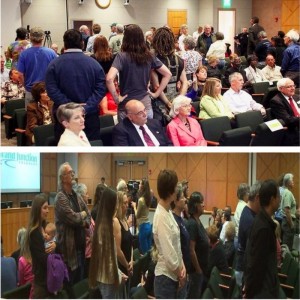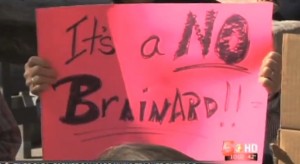
The Chamber selected and ran Rick Brainard for office. Brainard was arrested for 3rd degree assault four days after winning the election April 2, but the chamber continued to back him. After months of battling to try and keep his seat, Brainard finally resigned from Council in disgrace on July 18, 2013
The “Rick Brainard Debacle” of 2013 alerted citizens to the Grand Junction Chamber’s new intrusive political activity. People did not like what they saw.
What was this appalling episode?
In the local elections in Grand Junction in April, 2013, four seats on the seven-member City Council were up for grabs. Early on, the Chamber picked four allies (pdf) to run for City Council and pumped their campaigns full of money using the Western Colorado Business Alliance (WCBA), its then newly-created, 501(c)-4 “social welfare” organization and lobbying arm. The WCBA is an opaque money group that refuses to disclose its donors.
Three out of four of the Chamber’s candidates won the April, 2013 election. One of them, West Star Aviation executive Rick Brainard, was arrested by Grand Junction Police just four days after getting elected. He had struck his girlfriend hard enough to turn the entire side of her face black and blue. According to his official police affidavit, Brainard admitted hitting his girlfriend. He told Police that he had to do it because she “needed to shut her mouth.” Brainard’s arrest and comments about the incident drew widespread condemnation from Grand Junction citizens, who were horrified to discover they had elected a woman-beater to City Council. What was worse was that there was little they could do about it.
The “No Brainard” Campaign
The City Charter says a member of City Council can only be kicked off Council if he or she is convicted of a felony. As bad as his crime was, Brainard’s assault was booked as a 3rd degree misdemeanor. Sitting City Council members tried to help unseat him by passing a resolution opposing Brainard taking his seat on Council. Two members of Council wrote a letter to Brainard formally asking him to step down from his newly-won seat, but he staunchly refused. People rallied and marched from the Chamber of Commerce to City Hall with bullhorns protesting Brainard taking his seat, but Brainard insisted on assuming his seat on Council despite all this.
He first appeared in court for the assault charge on May 6, 2013 — the very same day he was scheduled to be sworn into office. Just minutes after appearing in Court and asking the judge to excuse him from all future court appearances, Brainard ran the four blocks over to City Hall and took his oath of office. In an unprecedented protest, 60 percent of the audience stood and turned their backs on Brainard to protest him taking his seat. In media interviews after the ceremony, Brainard claimed he didn’t see them!
After assuming his seat on Council, Brainard became a reviled public figure. Citizens faced a painful 90-day waiting period required by the City Charter before they could initiate a recall effort to push him out of office. Throughout this time, angry citizens lined up to speak in the public comment period at City Council meetings. One by one, people stood up and shamed Brainard. They implore him to step down and save citizens and the City a massive recall effort that was slated to cost over $50,000, but to no avail. Brainard refused to step down. Over the next few months, Brainard was fired from his executive job at West Star Aviation. He was pushed off several prestigious local boards and public protest against him continued unabated. The Daily Sentinel condemned Brainard, took back their endorsement of him and published an op-ed asking him to relinquish his seat. Media coverage of his activities was relentless.
Finally, on July 18, after a recall committee had been formed and trainings to gather signatures had started, Brainard finally resigned from Council in disgrace. Upon his departure Brainard denied that the protests, rallies, public rebukes, relentless negative commentary and the impending signature-gathering effort to recall him had anything to do with his stepping down. Instead, he blamed other members of City Council for being mean to him.
So how does the G.J. chamber figure into all this, besides selecting Brainard as a candidate and financing his campaign?
The Chamber’s Role
After his arrest and subsequent guilty plea, and during all the time Brainard clung to his council seat, there was only one  entity in town that continued to back him: the Grand Junction Area Chamber of Commerce.
entity in town that continued to back him: the Grand Junction Area Chamber of Commerce.
Through all the public anger and disgust at Brainard, the chamber continued to support him. The chamber refused to condemn his assault or suggest he step down from Council and save citizens the hassle and steep cost of a recall election. The Chamber continued supporting Brainard even after he pled guilty to assaulting his girlfriend in open court! The reason they continued to back him indicated that the Chamber far cares more about its own political leverage than the well-being of the City: If Brainard stepped down from Council, the Chamber would lose its majority of four loyalists on the seven-seat City Council. (Mayor Sam Susuras, the fourth Chamber loyalist, was already on Council wasn’t up for election.)
Thanks to the chamber’s backing Brainard as a candidate, citizens were forced to endure having a convicted woman-beater sit on City Council for months, and the Chamber did nothing during all that time to help outraged citizens dislodge him.

Two views of citizens turning their backs on Brainard at his swearing in ceremony May 6, 2013. (Photo Credit: Demand Rick Brainard Resign Grand Junction Facebook page)Brainard as a candidate, citizens were forced to endure having a convicted woman-beater sitting on City Council for months, and the Chamber did nothing during all that time to help outraged citizens dislodge him.
The Brainard episode opened peoples’ eyes, not only to the Chamber’s misguided priorities, but also to the extent of the Chamber’s misguided and inappropriate meddling in local politics. It also exposed the Chamber’s poor ability to select candidates for local office. Strangely, though, this episode also did citizens a big favor: It made people aware of the extent to which the Chamber has seized control of City Council, and the extent of the chamber’s influence on local elections. It also drew many citizens of like mind together for the first time, and helped people see that by working together, they can make beneficial change in the City.
Click here to read even more about the Chamber’s over-the-top involvement in City politics.

